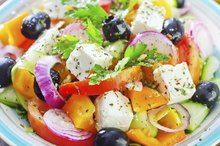What does fact checked mean?
At Healthfully, we strive to deliver objective content that is accurate and up-to-date. Our team periodically reviews articles in order to ensure content quality. The sources cited below consist of evidence from peer-reviewed journals, prominent medical organizations, academic associations, and government data.
- "Journal of Nutritional Biochemistry"; Dietary Methionine Effects on Plasma Homocysteine and HDL Metabolism in Mice; Wanda Velez; August 2007
- "Journal of Nutritional Biochemistry"; Dietary Methionine Effects on Plasma Homocysteine and HDL Metabolism in Mice; Wanda Velez; August 2007
- "Medical Hypotheses"; The Low-Methionine Content of Vegan Diets May Make Methionine Restriction Feasible as a Life Extension Strategy; McCarty MF, et al.; February 2009
- "Medical Hypotheses"; The Low-Methionine Content of Vegan Diets May Make Methionine Restriction Feasible as a Life Extension Strategy; McCarty MF, et al.; February 2009
- "The Journal of Nutrition"; Low Methionine Ingestion by Rats Extends Life Span; Orentreich N, et al.; February 1993
- "The Journal of Nutrition"; Low Methionine Ingestion by Rats Extends Life Span; Orentreich N, et al.; February 1993
The information contained on this site is for informational purposes only, and should not be used as a substitute for the advice of a professional health care provider. Please check with the appropriate physician regarding health questions and concerns. Although we strive to deliver accurate and up-to-date information, no guarantee to that effect is made.
Diet Low in Methionine
Metionine is an essential amino that your body needs to produce creatine and facilitate normal metabolism and growth. Your body needs between 800 mg and 1,000 mg per day to maintain normal health, the University of Pittsburgh Medical Center says. As of 2011, there was no therapeutic dose for methione. Although generally considered safe, a study published in a 2007 issue of the “Journal of Nutritional Biochemistry” found that a diet high in methionine caused decreased body weight and decreased high-density lipoproteins in rodent test subjects.
If you are experiencing serious medical symptoms, seek emergency treatment immediately.
Vegan Diets and Methionine
However, in order to maximize the benefits of a low methionine diet, adequate exercise is also required. More research is needed to further understand the long-term effects of a low methionine diet on humans.
Longer Life Span
Recommended Dose of L-Lysine
Learn More
Lifelong reduction of methionine dietary intake from 0.86 percent to 0.17 percent increased the life span of rat test subjects by 30 percent, according to a study published in a 1993 issue of “The Journal of Nutrition.” However, the study also found that a low methionine diet impaired growth despite increased food intake 4. Further research on the effects of a diet low in methionine on life span and growth will provide insight on its effects on human 4s
Foods to Avoid
Avoid foods like eggs, cheese, cod fish and seaweed, because they are high in methionine 1. Powdered egg whites contain about 3 g of methionine in every 100 g, the DietAndFitnessToday website notes 1. The methionine content of cheese, cod fish and seaweed is 1 g for every 100 g. Other dietary sources of methionine include high-protein foods like poultry, red meat and dairy products, the University of Pittsburgh Medical Center notes 1.
High-Density Lipoprotein and Homocysteine Levels
Foods That May Lower WBC
Learn More
A study published in a 2007 issue of the “Journal of Nutritional Biochemistry” found that mice on a diet high in methionine lost more than 20 percent of their body weight, but also had lower high-density lipoprotein, or HDL, levels compared to mice on low methionine diets 2. The study fed the mice a low folate diet and supplemented with methionine or folate in their drinking water for about seven weeks. The results showed that fasting homocysteine levels were higher in mice fed a diet that was low folate but high in methionine compared to mice fed a high folate and high methionine diet. This suggests that folate is somehow able to offset the effects that methionine has on homocysteine levels. Homocysteine is an amino acid that has been associated with higher risk of conditions like heart attack and stroke. More research is necessary to determine how a low methionine diet affects HDL and homocysteine levels in humans.
- A study published in a 2007 issue of the “Journal of Nutritional Biochemistry” found that mice on a diet high in methionine lost more than 20 percent of their body weight, but also had lower high-density lipoprotein, or HDL, levels compared to mice on low methionine diets 2.
- The results showed that fasting homocysteine levels were higher in mice fed a diet that was low folate but high in methionine compared to mice fed a high folate and high methionine diet.
Related Articles
References
- DietAndFitnessToday.com: Foods High in Methionine
- "Journal of Nutritional Biochemistry"; Dietary Methionine Effects on Plasma Homocysteine and HDL Metabolism in Mice; Wanda Velez; August 2007
- "Medical Hypotheses"; The Low-Methionine Content of Vegan Diets May Make Methionine Restriction Feasible as a Life Extension Strategy; McCarty MF, et al.; February 2009
- "The Journal of Nutrition"; Low Methionine Ingestion by Rats Extends Life Span; Orentreich N, et al.; February 1993
- National Center for Biotechnology Information. PubChem Database. Methionine. Updated September 21, 2019.
- Park BK, Dear JW, Antoine DJ. Paracetamol (acetaminophen) poisoning. BMJ Clin Evid. 2015;2015:2101. Published 2015 Oct 19.
- Cavuoto P, Fenech MF. A review of methionine dependency and the role of methionine restriction in cancer growth control and lifespan extension. Cancer Treat Rev. 2012;38(6):726-36. doi:10.1016/j.ctrv.2012.01.004
- Tapia-rojas C, Lindsay CB, Montecinos-oliva C, et al. Is L-methionine a trigger factor for Alzheimer's-like neurodegeneration?: Changes in Aβ oligomers, tau phosphorylation, synaptic proteins, Wnt signaling and behavioral impairment in wild-type mice. Mol Neurodegener. 2015;10:62. doi:10.1186/s13024-015-0057-0
- Brustolin S, Giugliani R, Félix TM. Genetics of homocysteine metabolism and associated disorders. Braz J Med Biol Res. 2010;43(1):1-7.
- Cottington EM, LaMantia C, Stabler SP, Allen RH, Tangerman A, Wagner C, Zeisel SH, Mudd SH. Adverse event associated with methionine loading test: a case report. Arteriosclerosis, thrombosis, and vascular biology. 2002 Jun 1;22(6):1046-50. doi:10.1161/01.ATV.0000020400.25088.A7
- ME, Han B, . Are we getting enough sulfur in our diet?. Nutr Metab (Lond). 2007;4:24. doi:10.1186/1743-7075-4-24
- Benevenga NJ, Steele RD. Adverse effects of excessive consumption of amino acids. Annual review of nutrition. 1984 Jul;4(1):157-81. doi:10.1146/annurev.nu.04.070184.001105
- Brok J, Buckley N, Gluud C. Interventions for paracetamol (acetaminophen) overdose. Cochrane Database of Systematic Reviews. 2006, Issue 2. Art. No.: CD003328. doi:10.1002/14651858.CD003328.pub2
- Benevenga NJ, Steele RD. Adverse effects of excessive consumption of amino acids. Annu Rev Nutr. 1984;4:157-8110. doi10.1146/04.070184.001105
- Garlick PJ. Toxicity of methionine in humans. J Nutr. 2006;136(6 Suppl):1722S-1725S. doi:10.1093/jn/136.6.1722S
- Jeon H, Kim JH, Lee E, et al. Methionine deprivation suppresses triple-negative breast cancer metastasis in vitro and in vivo. Oncotarget. 2016;7(41):67223-67234. doi:10.18632/oncotarget.11615
- Zhou ZY, Wan XY, Cao JW. Dietary methionine intake and risk of incident colorectal cancer: a meta-analysis of 8 prospective studies involving 431,029 participants. PLoS ONE. 2013;8(12):e83588. doi:10.1371/journal.pone.0083588
Writer Bio
Joseph Pritchard graduated from Our Lady of Fatima Medical School with a medical degree. He has spent almost a decade studying humanity. Dr. Pritchard writes as a San Francisco biology expert for a prominent website and thoroughly enjoys sharing the knowledge he has accumulated.









